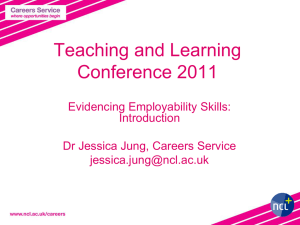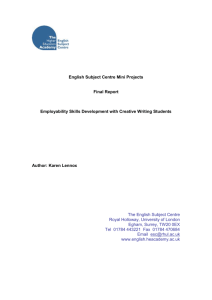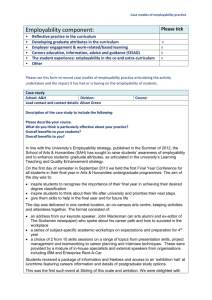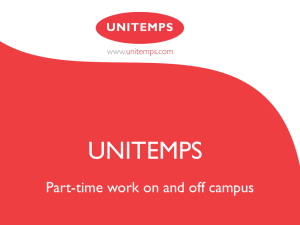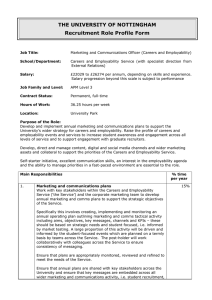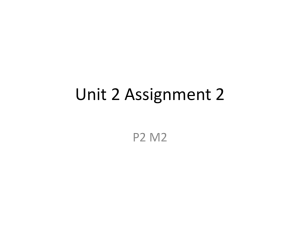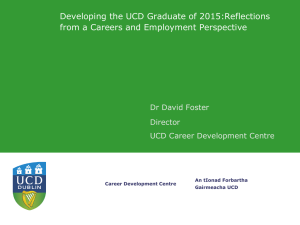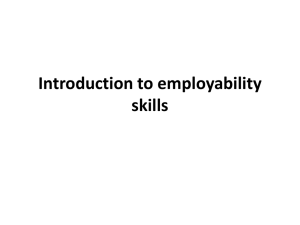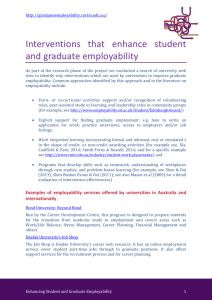Career Management Skills Overview
advertisement
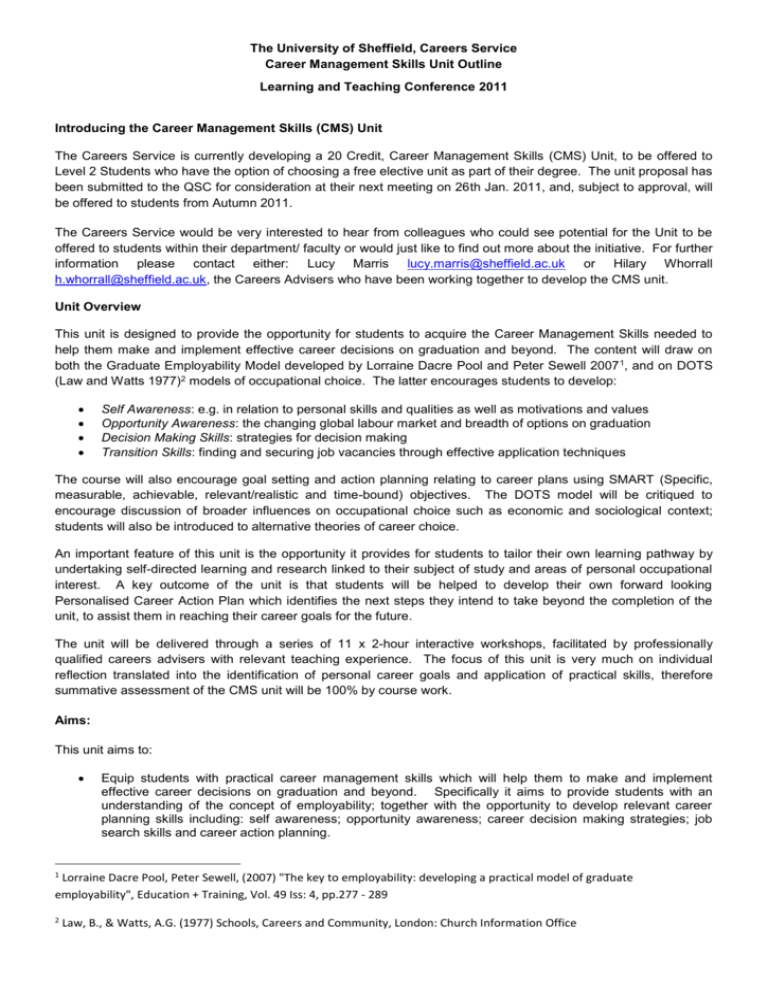
The University of Sheffield, Careers Service Career Management Skills Unit Outline Learning and Teaching Conference 2011 Introducing the Career Management Skills (CMS) Unit The Careers Service is currently developing a 20 Credit, Career Management Skills (CMS) Unit, to be offered to Level 2 Students who have the option of choosing a free elective unit as part of their degree. The unit proposal has been submitted to the QSC for consideration at their next meeting on 26th Jan. 2011, and, subject to approval, will be offered to students from Autumn 2011. The Careers Service would be very interested to hear from colleagues who could see potential for the Unit to be offered to students within their department/ faculty or would just like to find out more about the initiative. For further information please contact either: Lucy Marris lucy.marris@sheffield.ac.uk or Hilary Whorrall h.whorrall@sheffield.ac.uk, the Careers Advisers who have been working together to develop the CMS unit. Unit Overview This unit is designed to provide the opportunity for students to acquire the Career Management Skills needed to help them make and implement effective career decisions on graduation and beyond. The content will draw on both the Graduate Employability Model developed by Lorraine Dacre Pool and Peter Sewell 2007 1, and on DOTS (Law and Watts 1977)2 models of occupational choice. The latter encourages students to develop: Self Awareness: e.g. in relation to personal skills and qualities as well as motivations and values Opportunity Awareness: the changing global labour market and breadth of options on graduation Decision Making Skills: strategies for decision making Transition Skills: finding and securing job vacancies through effective application techniques The course will also encourage goal setting and action planning relating to career plans using SMART (Specific, measurable, achievable, relevant/realistic and time-bound) objectives. The DOTS model will be critiqued to encourage discussion of broader influences on occupational choice such as economic and sociological context; students will also be introduced to alternative theories of career choice. An important feature of this unit is the opportunity it provides for students to tailor their own learning pathway by undertaking self-directed learning and research linked to their subject of study and areas of personal occupational interest. A key outcome of the unit is that students will be helped to develop their own forward looking Personalised Career Action Plan which identifies the next steps they intend to take beyond the completion of the unit, to assist them in reaching their career goals for the future. The unit will be delivered through a series of 11 x 2-hour interactive workshops, facilitated by professionally qualified careers advisers with relevant teaching experience. The focus of this unit is very much on individual reflection translated into the identification of personal career goals and application of practical skills, therefore summative assessment of the CMS unit will be 100% by course work. Aims: This unit aims to: Equip students with practical career management skills which will help them to make and implement effective career decisions on graduation and beyond. Specifically it aims to provide students with an understanding of the concept of employability; together with the opportunity to develop relevant career planning skills including: self awareness; opportunity awareness; career decision making strategies; job search skills and career action planning. 1 Lorraine Dacre Pool, Peter Sewell, (2007) "The key to employability: developing a practical model of graduate employability", Education + Training, Vol. 49 Iss: 4, pp.277 - 289 2 Law, B., & Watts, A.G. (1977) Schools, Careers and Community, London: Church Information Office To help students maximise their lifelong career potential by providing a framework through which they are able to identify, articulate and market their transferable skills in a competitive global labour market. This will include developing increased awareness of the range of opportunities available and how to access them through demystifying selection techniques such as CVs, application forms and interviews. Intended Learning Outcomes - Following the completion of this unit, students will be able to: 1. With reference to the Graduate Employability Model, identify key employability skills developed through both their undergraduate studies and extracurricular activities, and undertake a personal audit of these transferable skills 2. Critically evaluate their career values; personality type; abilities and interests and demonstrate how these might impact on their future career choice 3. Identify the range of opportunities potentially available to students on graduation and discuss the extent to which those pathways are of personal relevance and interest and why 4. Undertake research into potential career ideas, demonstrating information literacy capabilities through accessing appropriate resources relating to both occupational and labour market information 5. Recognise up to three alternative models of Career Decision Making and choose an appropriate model of career choice that is relevant to their own situation 6. Demonstrate an understanding of how to market themselves effectively in competency based selection processes on paper and at interview 7. Produce a CV and covering letter appropriate for their job-search goals 8. Through an ongoing process of reflection, develop a Personal Career Action Plan identifying areas of possible occupational interest and steps to achieve them. Syllabus Overview: Week 1: Introduction to Career Management Skills Week 2: Employability - Concepts and theories of employability, auditing own employability skills Week 3: Self Awareness: Understanding of Personality types and reflection on reported type Week 4: Options on graduation and the Graduate Labour Market Week 5 – Career Choice, understanding career theory and decision making Week 6: Creative Job Search and Networking – accessing the hidden job market, making your own luck Week 7: Reading Week Week 8: CVs and Covering Letters (Looking good on paper 1) Week 9: Demystifying Application Forms (Looking good on paper 2) Week 10: Interviews (Now you’re talking! What to expect and how to prepare) Week 11: Skills Development Session – team working and assessment centres Week 12: Planning to Succeed (Personal Career Action Planning and CMS in context) 687304627 2
